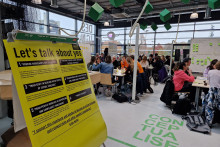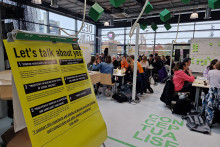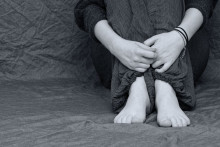The meeting kicked off with a presentation at DesignLab. Alexandra Mulder, campaign manager of the Amnesty initiative Let's Talk About Yes, took the floor first. In a short speech, she reminded the 60 attendees, mostly student board members, of the facts. Amnesty research shows that no less than 11 per cent of female students in the Netherlands experience rape, for men the figure is one per cent. That alone makes a manifesto against sexual violence at universities crucial, Mulder argued.
The UT could have signed the manifesto earlier, Sterre Mkatini, Diversity, Equity & Inclusion officer, said. However, the diversity officer pointed out, the university wanted to get its act together better first. Several initiatives were therefore launched over the past year. Among others, a special webpage on sexual violence was created. The university also started workshops and training sessions, for instance for doegroup parents prior to Kick-In.
This makes the signing of the manifesto primarily a confirmation of the work done, and a sign of commitment. The list includes six points, including offering workshops, training staff and involving students in the movement. The latter already happened on Thursday morning. Mkatini asked the student leaders present to raise their hands if they were doing enough within their association against sexual violence. Cautiously, a single hand went up. But most stayed down, or stuck somewhere halfway. Work to be done, in other words.
Manifesto
Signatories of the Amnesty manifesto pledge to stand up against sexual violence. They also will ensure that everyone in the community feels responsible for a culture where sex is based on equality and mutual consent. Sixteen Dutch higher education institutions have already signed the manifesto.
After the presentation, the student board members gathered in groups for a workshop. On post-its, they shared their experiences regarding sexual violence. Alcohol and setting boundaries proved to be hot topics. It also became clear that associations differ widely when it comes to measures and the availability of support. Some associations only have a link on their website, while others have a serious support structure.
The latter group seems to include student association Taste. The association has confidential counsellors and an anonymous hotline on its own website, says board member and UT student Hugo Beltman. Also, sober members are always present during pub nights, acting as contact person. As to whether it is enough, Beltman dares not say. Last year, there were no reports of sexual violence at Taste.
According to Beltman, the issue around transgressive behaviour has been more prevalent within the student community recently. 'I think that is positive. It is ultimately about awareness.' He also believes the workshop and manifesto are a good initiative. 'It's only a pity there are no other student associations today except Taste. It is precisely from them that we can learn.'
Exchanging experiences
Sports associations did attend, including the board members of volleyball club Harambee. Within the club, there were a few cases of sexually transgressive behaviour in recent years, says director Zare van Haaren. This happened during parties and around the sports activities. At the moment, the volleyball club only has a link on their website, but the current board wants to change that, for instance by installing confidential counsellors. 'With that, the workshop fits well with what we are doing as an association: we can learn from other boards.'
At lacrosse association Phoenix, they also experienced some cases of transgressive behaviour. On these, however, board members Lieke Nijhof and Pieterpaul Muis do not want to elaborate. According to them, the support structure within the club is well organised. 'We are generally well prepared. Within Phoenix we were already taking measures even before the scandal at The Voice. Our association has confidential counsellors and there is an option to report incidents anonymously. We are glad we were able to help other boards today.'
At klonkie ball association Klocus (a special kind of sport, which involves drinking beer among other things), these tips are welcome. The association is relatively young and has experienced rapid growth in recent years. An official support structure has not been established, yet. 'Our association was always quite small and close,' says board member Ivo de Vries. 'If something is going on, we hear about it quickly. And we speak to each other about it. We remind each other of boundaries.'
In the coming period, De Vries wants to make these unwritten rules of conduct more explicit. 'In that respect, this meeting is a nice start. We can, for instance, share on our socials that we are working on it.' The board member calls the UT's signing of the manifesto 'a nice symbol'. 'But I find it difficult to interpret exactly what it means.'
According to rector Tom Veldkamp, it should not stop at words, he revealed during his short speech before the official signing. 'Signing is easy. In the end, it's about changing the culture, and creating a safe environment for everyone. I am glad that the students of Let's Talk About Yes have taken the initiative, pushing us as a university to take action.'








